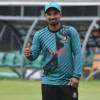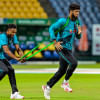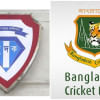‘We don't use first-class cricket like other countries’

Bangladesh cricket needs to adopt a "ruthless" decentralised model in player selection, where decisions are spread across a broader structure rather than concentrated in one individual's hands, opined David Moore, who is stepping down from his role as the Bangladesh Cricket Board's (BCB) Head of Programs at the end of his contract this month due to family commitments.
Moore, who joined the BCB in January last year, has made significant strides, organising the Bangladesh A team's tours to Pakistan this year -- which played its part in Bangladesh's epic Test series win in Rawalpindi -- and the High Performance team's tour of Australia, with the foresight of providing experience for those earmarked to play in the 2027 Test series in Australia.
"I thought the tour to Australia with the HP was really good… We've got to think strategically about how we plan our tours," Moore told The Daily Star on Monday before his departure.
According to the Australian, however, the role of HP teams often diverges from their intended purpose, leading to players staying in the system for extended periods without being promoted to higher levels.
"Someone not being picked [in the national team after a certain age] doesn't mean he should be in HP. That's not what it's for. That's what first-class cricket's for," he asserted.
Drawing a comparison with his home country, Moore stressed that decentralisation was key to Bangladesh's cricketing future, with regional bodies taking responsibility for player development.
"I think the Bangladeshi people are too nice sometimes. Because the system I came through, they're ruthless. I think that we don't use first-class cricket like other countries use first-class cricket," he said.
One of Bangladesh's ongoing struggles has been the difficulty in building a robust player pool. Moore noted that identifying the right kind of players within Bangladesh's vast population is no easy feat.
"Massive. The bigger the population, the harder, the more difficult talent identification is. It is really scientific. So we make sure that they're fit, they're game smart. You've got to make some tough decisions on the way and there's got to be open and transparent selections," he added.
Having worked closely with former head coach Chandika Hathurusingha, Moore moved the vital cogs from the background for two years in developing a framework.
"You need the [national] head coach to identify what they're looking for. You know, do they need leg spinners, do they need finger spinners, etc. You look at all the best nations, they have a fully integrated program from the bottom to the top. There is complete communication, and U-15 to U-19 levels all work very closely with HP or the academy programs that run the A tours.
"And national selectors in countries know what's going on at the under-15 level and so on. So I think one of the things that I would have liked to have seen happen was a fully integrated system from fifteens up to the top," Moore opined.
After the change in BCB's hierarchy following the political changeover on August 5, the Australian informed that he had found it more challenging to communicate ideas. With no standing committees, BCB president Faruque Ahmed had too much on his plate, running several departments.
"It was tough because of change. Like the new president's been trying to put in place a program for the whole BCB to regenerate. It's tough to be thinking about HP when you've got really big things you've got to deal with as well," Moore said.

 For all latest news, follow The Daily Star's Google News channel.
For all latest news, follow The Daily Star's Google News channel. 







Comments